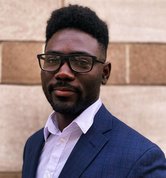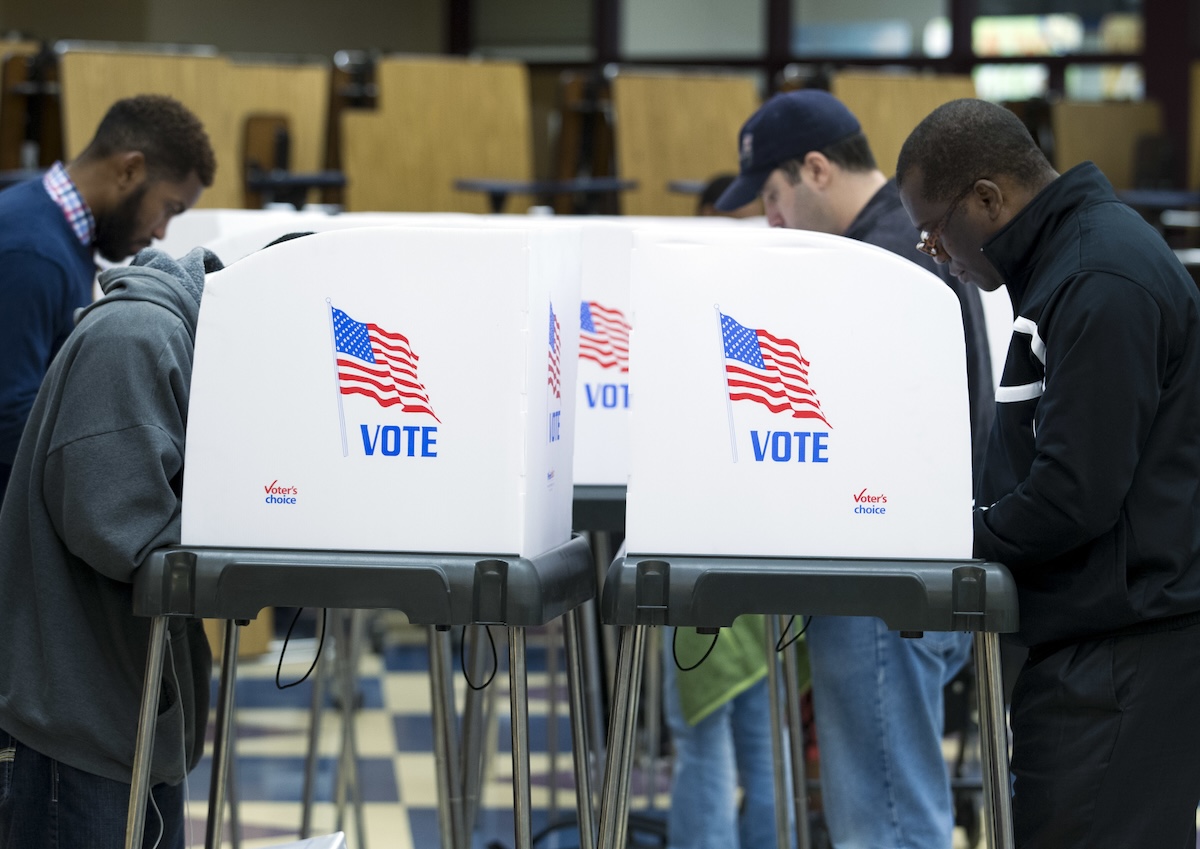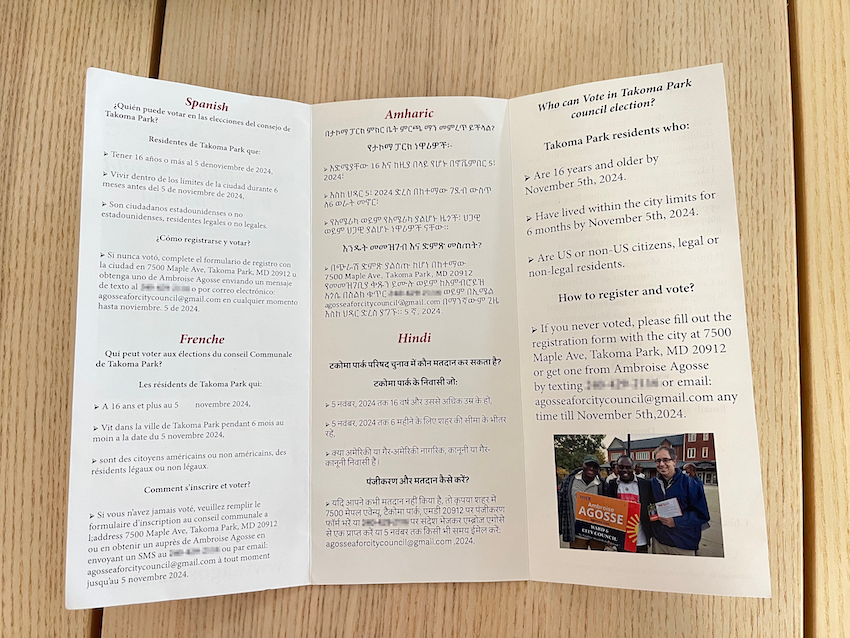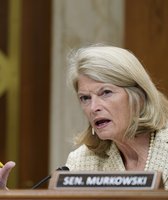Stand up for the facts!
Our only agenda is to publish the truth so you can be an informed participant in democracy.
We need your help.
I would like to contribute
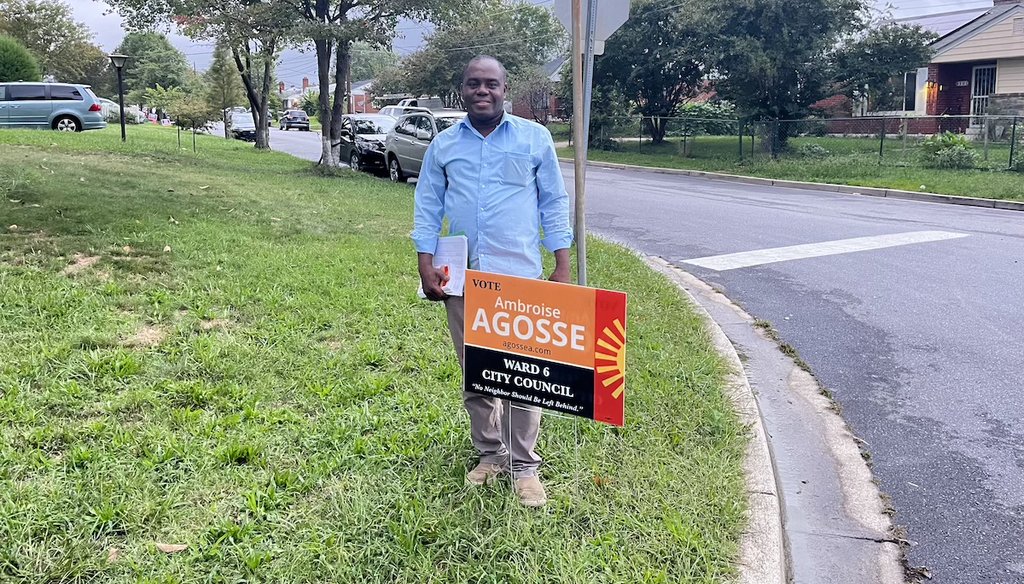
Takoma Park Ward 6 city council candidate Ambroise Agosse stands next to a yard sign during door-to-door canvassing Sept. 27, 2024. (PolitiFact/Kwasi Gyamfi Asiedu)
TAKOMA PARK, Md. — When Ambroise Agosse volunteered in 2020 with a mayoral candidate’s campaign here, he faced an unusual hurdle: persuading his wife to register to vote for the candidate.
"It wasn't easy, she refused," Agosse recalled, because she worried it would affect her citizenship application. He immigrated to the United States from Benin, West Africa, in 2011, and became a U.S. citizen in 2017. But at the time of the 2020 local election, his wife was not.
Takoma Park has allowed noncitizens — including lawful U.S. residents and immigrants in the country illegally — to vote in local elections since 1993.
A city of about 17,000 people that borders Washington, D.C., on its western and southern sides, Takoma Park is liberal-leaning and declared itself a sanctuary city for migrants in 1985. It was one of the first U.S. cities to allow residents who are not U.S. citizens to vote in municipal elections. The city also extended municipal voting rights to 16- and 17-year-olds in 2013.
In the early 1990s, the city had a growing immigrant population concentrated in certain wards, which meant fewer voters in those areas. Residents who championed the idea of noncitizen voting hoped that giving them voting rights would increase their participation in civic issues that affect quality of life.
That hasn’t happened. Noncitizen voter turnout has been low. Some say they’re reluctant to vote because of fear it could negatively affect immigration applications or because sharing personal information with governments could make them easily traceable for deportation. As Republican leaders have amplified claims about noncitizen voters in this year’s election, we examined how Takoma Park started and manages its longtime noncitizen voting process.
Takoma Park’s foreign-born population has grown from around 12% in the 1980s to 30% now, census data shows. The U.S. Census Bureau does not collect data on the immigration status of people born abroad.
During the 2024 election cycle, Republican politicians have often repeated unsubstantiated claims about Democrats registering noncitizens to vote in federal elections. Sometimes, Republicans point to the handful of U.S. cities that allow noncitizen voting in municipal elections as evidence of what they baselessly say is a Democratic plot.
House Speaker Mike Johnnson said in May that noncitizen voting poses a "clear and present danger to the integrity of our election system." In September, Johnson said, "If you have a few thousand illegals participate in the election in the wrong place, you can change the makeup of Congress and you can affect the presidential election."
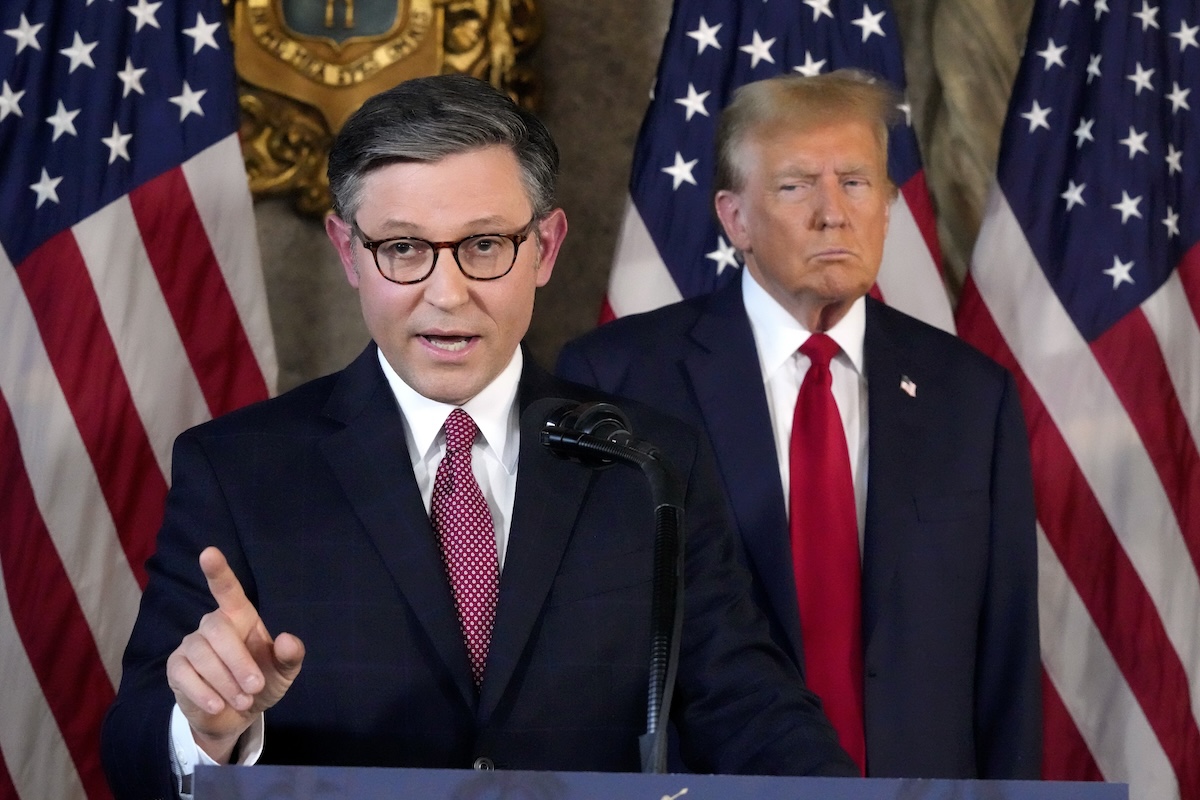
U.S. House Republicans have introduced bills to require proof of citizenship during voter registration; to cut federal election funding in places where noncitizens can vote in local elections; and to block a new law that lets noncitizens vote in the District of Columbia’s local elections. The U.S. House passed the Safeguard American Voter Eligibility Act, called the SAVE Act, in July but it failed in the Democratic-controlled Senate.
Despite Republican claims, experts have consistently said noncitizen voting in federal elections is rare, and in instances when it occurred, it could not swing election results.
A federal noncitizen voting ban already exists, making it a federal crime punishable by up to one year in prison. In Maryland, noncitizens who register to vote in state and federal elections face a prison sentence up to 10 years. Offenders also risk deportation.
Evidence shows that noncitizen voting is "very low frequency and the system is pretty good at preventing it," said Walter Olson, senior fellow at the Cato Institute, a libertarian think tank.
"There doesn't seem to be a large group of people trying to do it in the first place."
In Takoma Park, noncitizens have had municipal voting rights for 30 years, but very few of them exercise that right.
Olson told PolitiFact he understands the apprehension.
"You never know when some bureaucratic or federal agency is going to get some information that is ambiguous and mistake (someone) for having voted in a federal election," he said. "With the high downside, and the upside just consisting of casting one vote in Takoma Park, I don’t blame people at all."
Takoma Park local ordinance prohibits city officials from releasing "any information regarding the citizenship or immigration status of any individual to any third party."
Takoma Park’s unique system
Takoma Park’s voter roll includes U.S. citizens, noncitizens and 16- and 17-year old residents.
To update its voter roll, the city receives voter registration information on U.S. citizen residents from Maryland’s State Board of Elections. That agency is responsible for registering voters for statewide and federal elections, which are open only to U.S. citizens. Sixteen- and 17-year-olds who are U.S. citizens may preregister for state and federal elections but cannot vote until they turn 18.
Takoma Park’s independent municipal voter roll is not transmitted to the state or federal government, according to Jessie Carpenter, Takoma Park’s city clerk.
"Our (city) election is completely separate from the presidential election," Carpenter told PolitiFact. The paper ballot includes only local candidates and the city has only one location for in-person voting on Election Day. The city also has universal mail-in voting for municipal elections. To vote in federal and state elections, residents must go to a different location on Election Day.
The local, state and federal elections "are on the same day, but they are not interrelated at all," Carpenter said. "So there is no chance that someone who is registered for the purpose of voting in the city only will also end up voting with the state because their name isn’t provided to the state."
From 1993 to 2017, the number of noncitizens who voted in Takoma Park’s biannual municipal election peaked at 72 in the 2017 mayoral election, of 2,520 votes cast, the most recent year for which the city has data, according to records the city shared with PolitiFact. The city stopped collecting data on noncitizens on its voter rolls after 2017, but Carpenter said she believes registration by noncitizens was very low.
Low noncitizen voter turnout has also been the case in local elections in the few Vermont cities that allow it. In March 2024 local Vermont elections, 11 noncitizens voted in Winooski, 13 in Montpellier and 62 in Burlington, PBS reported. In the District of Columbia, 115 noncitizens voted in June’s local election out of 378,821 total registered voters, the capital’s Board of Elections said.
Carpenter said she didn’t know of any active opposition to noncitizen voting in Takoma Park.
"I have not heard, from within the city, opposition to our law. I hear about it from time to time from (people) outside the city but not from here," she said. "I think our residents are very accustomed to our processes and I think it is a well settled process here that is not really challenged locally."
Olson has become a widely cited noncitizen voting expert and debunker of false narratives about that cohort. But when his own city — Frederick, Maryland — was debating whether to allow noncitizen voting, Olson was a vocal opponent.
Frederick’s Board of Aldermen voted 4-1 in September in favor of allowing noncitizen voting, beginning with 2025 local elections. Olson said the current political climate is one of many reasons he opposed the measure.
"At a time when millions of people believe there is a plot to steal American elections by inviting millions of noncitizens to illegally vote in federal elections," he said, "you are just adding fuel for more misunderstanding."
Fear keeps some noncitizen voters away
Voters narrowly approved Takoma Park’s noncitizen voting initiative in a 1991 referendum and the city council passed it in 1992.
Proponents of the campaign, called "Share the Vote," hoped it would help solve the problem of low numbers of ballots cast in certain wards because of a high concentration of immigrants in those places. The campaign’s leaders hoped that by giving noncitizens the right to vote, more city residents would be involved in routine local government decisions about issues such as local parks and transportation.
But more than 30 years later, even some of the Share the Vote plan’s 1990s architects say this has not happened.
"The number of registered noncitizen voters is small and they are not decisive in any election," said George Leventhal, who co-chaired the Share the Vote campaign with U.S. Rep. Jamie Raskin, D-Md., before Raskin was elected to Congress. "It has not had a profound or transformative effect on city politics. A few civically minded neighbors want to participate and they do and that is OK."
Many noncitizens are afraid that voting could negatively affect future immigration applications. They fear the federal government "may say they have done something illegal in the past" by registering to vote and refuse their citizenship applications, Agosse said.
The U.S. citizenship application form asks applicants to answer under penalty of perjury if they have voted in federal, state or local elections. It instructs applicants to answer "no" in cases where noncitizens voted in local elections where they are allowed to. The question is also among the most common queries asked during the citizenship interview.
The fear is compounded for immigrants in the country illegally who are wary of sharing information such as addresses with governments, believing it can make them easily traceable for arrests and deportation.
"They are scared that this is the way to put them in some system where (immigration officials) can have access to them," Agosse said.
Voter canvassing in Takoma Park
Agosse is running in November for city council to represent Ward 6, which has a high percentage of the city’s immigrant population. As dusk fell on a recent evening in the city — a time when people are likelier to be at home — Agosse left his office with a stack of campaign pamphlets for a round of door-to-door canvassing.
Besides his campaign promises, the pamphlets remind residents of voter registration eligibility requirements in five languages. With low turnout expected, every new voter reached matters in this election.
A campaign pamphlet educates Takoma Park residents about voter eligibility in local elections. (PolitiFact/Kwasi Gyamfi Asiedu)
While canvassing, Agosse met Valerie Doungue, a health care worker from Cameroon who has lived in Takoma Park for eight years. Doungue said she didn’t know she is eligible to vote in municipal elections, but she is hesitant because of a pending permanent resident application. "If something is gonna happen (to my application), I'm not gonna do it," she said.
Another Takoma Park resident Agosse met, Emy Gonzalez, who became a U.S. citizen three years ago, said, "A lot of people think that immigrants don't pay any taxes. As long as you are able to contribute to the economy, they should definitely have a vote."
For now, the original goal of adding noncitizen voters to bring more people into a democratic process has not materialized. If immigrants were not fearful, Agosse believes it would be a very different election.
"There (would be) no competition. I will definitely win with no question."
Our Sources
Cornell Law School, 18 U.S. Code - Voting by aliens, accessed Oct. 8, 2024
Takoma Park, 2022 City Election Results, Oct. 8, 2024
City of Takoma Park, 30 Years of Non-Citizen Voting in Takoma Park, Oct. 6, 2023
PolitiFact, Noncitizens can vote in Washington, D.C., local elections, not federal elections, May 30, 2024
PolitiFact, Mike Johnson’s false claim about noncitizens registering to vote at DMV, ‘welfare’ offices, May 20, 2024
PolitiFact, Republicans push for noncitizen voting ban in Congress. But a federal ban already exists., April 12, 2024
PolitiFact, Trump's claim that millions of immigrants are signing up to vote illegally is Pants on Fire!, Jan. 12, 2024
The Washington Post, Takoma Park Offers Refugees Sanctuary From Two Countries, Oct. 30, 1985
The Washington Post, The truth about noncitizen voting in federal elections, Mar. 6, 2024
Maryland State Board of Elections, Maryland Voter Registration Application, accessed Oct. 9, 2024
CATO Institute, Noncitizens Don’t Illegally Vote in Detectable Numbers, Nov. 25, 2020
CATO Institute, The Right’s Bogus Claims about Noncitizen Voting Fraud, Apr. 11, 2024
PBS News, Here’s how many teens and non-U.S. citizens voted legally on Town Meeting Day, Apr. 2, 2024
The Associated Press, Illegal voting by noncitizens is rare, yet Republicans are making it a major issue this election, Sept. 2, 2024
C-SPAN, Speaker Johnson News Conference on Voter Eligibility Legislation, May 8, 2024
Brennan Center, Noncitizen Voting Is Already Illegal — and Vanishingly Rare, Apr. 17, 2024
USA Today, In case of loss, Republicans prepare to blame noncitizens voting − which is incredibly rare, Sept. 26, 2024
The Associated Press, Speaker Johnson pushes ahead on funding bill with proof of citizenship mandate despite dim prospects, Sept. 10, 2024
X post, Speaker Mike Johnson, May 12, 2022
Congress, American Confidence in Elections Act, July 11, 2023
National Immigration Forum, The Myths and Truths of Noncitizen Voting in the United States, May 7, 2024
The Takoma Park Municipal Code, Rights of Non-U.S. Citizens In Takoma Park, accessed Oct. 18, 2024
City of Takoma Park, Election Information: Two Separate Elections on Tuesday, November 5, 2024, Oct. 7, 2024
City of Takoma Park, Community Profile: Takoma Park Demographics, accessed Oct. 18, 2024
U.S. Census Bureau, About the Foreign-Born Population, accessed Oct. 15, 2024
U.S. Census Bureau, Quick Facts - Takoma Park city, Maryland, accessed Oct. 15, 2024
NBC 4 Washington, Frederick leaders approve letting noncitizens vote in local elections, Sept. 20, 2024
The Frederick News-Post, Proposal for noncitizen voting should be scrapped, Jun. 29, 2024
Interview with Ambroise Agosse, Takoma Park Ward 6 candidate, Sept. 27, 2024 and Oct. 16, 2024
Interview with Valerie Doungue, resident of Takoma Park, Sept. 27, 2024
Interview with Walter Olson, senior fellow Cato Institute, Oct. 15, 2024
Interview with Arturo Castellanos Canales, Policy and Advocacy Manager, National Immigration Forum, Oct. 15, 2024
Interview with George Leventhal, former Montgomery County council member, Sept. 17, 2024
Interview with Jessie Carpenter, Takoma Park city clerk, July 2, 2024, Sept. 26, 2024, Oct. 9, 2024 and Oct. 18, 2024
Interview with Emy Gonzalez, Takoma Park resident, Sept. 27, 2024
Interview with Xavier Simon, Takoma Park resident, Sept. 27, 2024
Interview with Talisha Searcy, Mayor of Takoma Park, Sept. 27, 2024
Interview with Seth Grimes, former Takoma Park City Council member and community organizer, July 9, 2024
Interview with Cindy Dyballa, Takoma Park Ward 2 Council member, July 5, 2024
